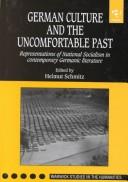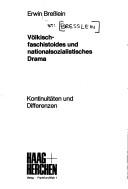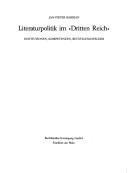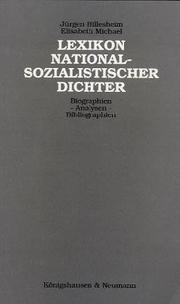| Listing 1 - 10 of 56 | << page >> |
Sort by
|

ISBN: 0754601129 Year: 2001 Volume: *2 Publisher: Aldershot Ashgate
Abstract | Keywords | Export | Availability | Bookmark
 Loading...
Loading...Choose an application
- Reference Manager
- EndNote
- RefWorks (Direct export to RefWorks)

ISBN: 3881293183 9783881293181 Year: 1980 Publisher: Frankfurt a. M.: Haag und Herchen,
Abstract | Keywords | Export | Availability | Bookmark
 Loading...
Loading...Choose an application
- Reference Manager
- EndNote
- RefWorks (Direct export to RefWorks)
German drama --- Nationalism in literature --- National socialism in literature
Book
ISBN: 082144672X 9780821446720 9780821423646 Year: 1984 Publisher: Athens, Ohio
Abstract | Keywords | Export | Availability | Bookmark
 Loading...
Loading...Choose an application
- Reference Manager
- EndNote
- RefWorks (Direct export to RefWorks)
National socialism in literature. --- National socialism and literature. --- Children --- Books and reading
Book
ISBN: 3846746223 Year: 2009 Publisher: Paderborn : Wilhelm Fink Verlag,
Abstract | Keywords | Export | Availability | Bookmark
 Loading...
Loading...Choose an application
- Reference Manager
- EndNote
- RefWorks (Direct export to RefWorks)
Das Anliegen dieses Buches ist ein doppeltes. Zum einen spürt es dem politischen Möglichkeitenhorizont nach, wie ihn die Ästhetik der Klassischen Moderne in sich birgt. Zum anderen wird gezeigt, dass dieser Horizont die Möglichkeit des politischen Totalitarismus – des Nationalsozialismus zumal – nicht aus-, sondern einschließt. Wichtige, ja kanonische Texte der deutschsprachigen Literatur der Klassischen Moderne weisen einen Richtungssinn genuin moderner ästhetischer Autonomie auf, der sich gerade auch in der Dimension des Politischen zur Wirkung bringen soll: Aufgrund ihrer ästhetischen Struktur – und eben nicht wegen ihrer manifesten Aussagegehalte – haben diese Texte jenen Denkraum (mit-) eröffnet, innerhalb dessen sich auch der Nationalsozialismus als politisches Projekt situiert hat, und zwar seinerseits als ein solches, das sich nirgendwo anders als in der Dimension des Ästhetischen fundiert sehen wollte. Das politische Imaginäre dieses nationalsozialistischen Projekts – unter Einschluss seiner verhängnisvollen rassistischen Auswirkungen – gehört so einer bestimmten, bis heute jedoch nur zu gern marginalisierten Richtung der Moderne irreduzibel zu.
Book
ISBN: 9783835305021 3835305026 Year: 2009 Publisher: Göttingen : Wallstein,
Abstract | Keywords | Export | Availability | Bookmark
 Loading...
Loading...Choose an application
- Reference Manager
- EndNote
- RefWorks (Direct export to RefWorks)
Generations --- German literature --- Literary movements --- National socialism in literature --- Popular literature --- Roman --- History and criticism --- Classification --- Roman.

ISBN: 9783765717604 3765717606 Year: 1995 Publisher: Frankfurt am Main: Buchhändler-Vereinigung,
Abstract | Keywords | Export | Availability | Bookmark
 Loading...
Loading...Choose an application
- Reference Manager
- EndNote
- RefWorks (Direct export to RefWorks)

ISBN: 3884795112 Year: 1993 Publisher: Würzburg Königshausen und Neumann
Abstract | Keywords | Export | Availability | Bookmark
 Loading...
Loading...Choose an application
- Reference Manager
- EndNote
- RefWorks (Direct export to RefWorks)
Authors, German --- German literature --- National socialism in literature --- Politics and literature --- Biography --- Bibliography --- History and criticism --- History
Multi
ISBN: 9780748668656 9780748668649 0748668640 Year: 2022 Publisher: Edinburgh Edinburgh University Press
Abstract | Keywords | Export | Availability | Bookmark
 Loading...
Loading...Choose an application
- Reference Manager
- EndNote
- RefWorks (Direct export to RefWorks)
Book
ISBN: 9783110202434 3110202433 9786612196638 1282196634 3110206595 9783110206593 9781282196636 6612196637 Year: 2008 Publisher: Berlin Boston
Abstract | Keywords | Export | Availability | Bookmark
 Loading...
Loading...Choose an application
- Reference Manager
- EndNote
- RefWorks (Direct export to RefWorks)
Memory Matters juxtaposes in tripartite structure texts by a child of German bystanders (Wolf), an Austrian-Jewish child-survivor (Klüger), a daughter of Jewish émigrés (Honigmann), a daughter of an officer involved in the German resistance (Bruhns), a granddaughter of a baptized Polish Jew (Maron), and a granddaughter of German refuges from East Prussia (Dückers). Placed outside of the distorting victim-perpetrator, Jewish-German, man-woman, and war-postwar binary, it becomes visible that the texts neither complete nor contradict each other, but respond to one another by means of inspiration, reverberation, refraction, incongruity, and ambiguity. Focusing on genealogies of women, the book delineates a different cultural memory than the counting of (male-inflected) generations and a male-dominated Holocaust and postwar literature canon. It examines intergenerational conflicts and the negotiation of memories against the backdrop of a complicated mother-daughter relationship that follows unpredictable patterns and provokes both discord and empathy. Schaumann's approach questions the assumption that German-gentile and German-Jewish postwar experiences are necessarily diametrically opposed (i.e. respond to a "negative symbiosis") and uncovers intersections and continuities in addition to conflicts.
German literature --- Collective memory and literature. --- Women and literature --- National socialism in literature. --- Holocaust, Jewish (1939-1945), in literature. --- Literature and collective memory --- Literature --- Women authors --- History and criticism. --- History --- Collective memory and literature --- Holocaust, Jewish (1939-1945), in literature --- National socialism in literature --- Women authors&delete& --- History and criticism --- Holocaust (in literature). --- National Socialism (in literature). --- Women's literature. --- generation.

ISBN: 3906752755 Year: 1994 Volume: 1474 Publisher: Bern Lang
Abstract | Keywords | Export | Availability | Bookmark
 Loading...
Loading...Choose an application
- Reference Manager
- EndNote
- RefWorks (Direct export to RefWorks)
| Listing 1 - 10 of 56 | << page >> |
Sort by
|

 Search
Search Feedback
Feedback About UniCat
About UniCat  Help
Help News
News